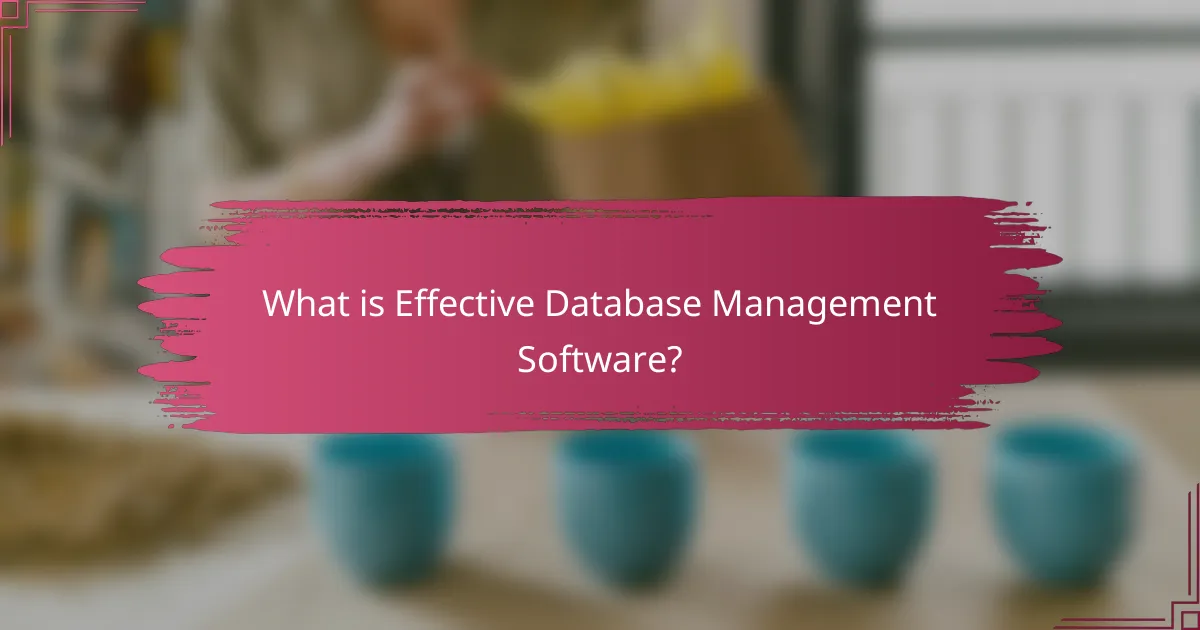Effective Database Management Software (DBMS) is a critical tool for creating, managing, and manipulating databases, offering essential functionalities such as data storage, retrieval, and organization. Key features of effective DBMS include ensuring data integrity and security through access controls and backup options, as well as supporting various data models like relational and NoSQL. Popular DBMS examples include MySQL, Oracle, and Microsoft SQL Server. Organizations that implement effective DBMS can enhance data management efficiency by up to 40%, which is vital for data-driven decision-making. This article explores the features, benefits, and use cases of effective DBMS to provide insights into optimizing database management for businesses.

What is Effective Database Management Software?
Effective Database Management Software (DBMS) is a tool that enables users to create, manage, and manipulate databases efficiently. It provides functionalities like data storage, retrieval, and organization. Effective DBMS ensures data integrity and security through access controls and backup options. It supports various data models, such as relational and NoSQL, to cater to diverse needs. Popular examples include MySQL, Oracle, and Microsoft SQL Server. According to a report by Gartner, organizations that utilize effective DBMS can improve data management efficiency by up to 40%. This efficiency is critical for businesses that rely on data-driven decision-making.
How does Effective Database Management Software function?
Effective Database Management Software functions by organizing, storing, and retrieving data efficiently. It uses a structured approach to manage data through databases. Users can create, read, update, and delete data using various interfaces. The software ensures data integrity through validation rules and constraints. It also manages user access and permissions to maintain security. Query languages like SQL allow users to interact with the database effectively. Additionally, it supports data backup and recovery processes to prevent data loss. These functions are essential for businesses to maintain accurate and accessible data.
What are the key components of Effective Database Management Software?
The key components of effective database management software include data storage, data retrieval, and data security. Data storage allows for efficient organization of information. Data retrieval enables users to access and manipulate stored data quickly. Data security protects sensitive information from unauthorized access. Additionally, user interface and reporting tools enhance usability. Backup and recovery features ensure data integrity. Scalability allows the system to grow with organizational needs. These components collectively contribute to the effectiveness of database management software.
How do these components interact to manage data?
Database management software components interact through a structured framework. These components include the database engine, user interface, and data storage. The database engine processes queries and manages data transactions. The user interface allows users to interact with the database easily. Data storage holds the actual data and ensures its integrity.
When a user inputs a query through the interface, the engine interprets it and accesses the relevant data from storage. The engine then executes the query and returns results to the user interface. This interaction ensures efficient data retrieval and manipulation.
According to a 2021 report by Gartner, effective database management systems can improve data processing speed by up to 50%. This statistic highlights the importance of the interaction between these components in managing data efficiently.
What features are essential in Effective Database Management Software?
Effective Database Management Software must include features such as data integrity, security, scalability, and user-friendly interfaces. Data integrity ensures accuracy and consistency of data throughout its lifecycle. Security features protect sensitive information from unauthorized access and breaches. Scalability allows the software to handle increased loads as the organization grows. User-friendly interfaces facilitate ease of use for database administrators and end-users. Additionally, robust backup and recovery options are essential to prevent data loss. Efficient query processing enhances performance and enables quick data retrieval. These features collectively ensure that the software meets organizational needs effectively.
What are the core functionalities of Effective Database Management Software?
Effective Database Management Software (DBMS) provides essential functionalities for data handling. Core functionalities include data storage, data retrieval, data manipulation, and data administration.
Data storage allows for the organization of large volumes of information efficiently. Data retrieval enables quick access to stored information through queries. Data manipulation includes operations such as updating, deleting, and inserting data.
Data administration features support user access control and security measures. Backup and recovery functionalities protect data integrity against loss. Performance tuning optimizes database efficiency and response times.
These functionalities ensure effective management of databases in various applications, enhancing productivity and data reliability.
How do advanced features enhance data management?
Advanced features enhance data management by improving efficiency and accuracy. They enable automation of repetitive tasks, reducing human error. Advanced analytics tools provide deeper insights into data trends. Enhanced security features protect sensitive information from breaches. Real-time data processing allows for immediate decision-making. Integration capabilities facilitate seamless data sharing across platforms. Customizable reporting tools enable tailored insights for specific business needs. These enhancements ultimately lead to better data governance and compliance with regulations.
What benefits does Effective Database Management Software provide?
Effective Database Management Software enhances data organization and accessibility. It allows for efficient data retrieval, reducing time spent searching for information. This software also improves data integrity by minimizing errors through validation processes. Furthermore, it facilitates data security by implementing access controls and encryption. Scalability is another benefit, enabling businesses to expand their database as needed. Additionally, it supports data backup and recovery, safeguarding against data loss. Finally, it allows for better collaboration among users by providing shared access to data.
How does it improve data accuracy and integrity?
Effective database management software improves data accuracy and integrity by automating data entry and validation processes. Automation minimizes human errors during data input. It also enforces data standards and formats, ensuring consistency across datasets. Real-time data validation checks further enhance accuracy by identifying discrepancies immediately. Regular backups and version control systems protect against data loss and corruption. According to a study by the International Journal of Information Management, organizations using effective database management software reported a 30% increase in data integrity. These features collectively ensure that the data remains reliable and trustworthy for decision-making.
What impact does it have on operational efficiency?
Effective database management software significantly enhances operational efficiency. It streamlines data storage and retrieval processes. This leads to faster decision-making and improved productivity. Automated data management reduces manual errors and saves time. Integration with other systems allows seamless workflows. According to a study by Gartner, organizations using effective database management see a 20% increase in operational efficiency. Enhanced data accuracy and accessibility support better customer service. Overall, such software optimizes resource allocation and boosts organizational performance.
How can businesses implement Effective Database Management Software?
Businesses can implement effective database management software by following a structured approach. First, they should assess their specific data requirements. Understanding the types and volume of data is essential. Next, selecting the right database management system (DBMS) that aligns with these needs is crucial. Popular options include MySQL, Oracle, and Microsoft SQL Server.
After selecting a DBMS, businesses must plan the database architecture. This involves defining data models and relationships. Data integrity and security measures should also be established at this stage.
Training staff is another critical step. Employees should understand how to use the software effectively. Regular updates and maintenance of the database system are necessary for optimal performance.
Finally, businesses should monitor and evaluate the system’s performance continuously. This ensures that it meets evolving data needs and maintains efficiency. According to a report by Gartner, effective database management can improve business decision-making by up to 50%.
What steps are involved in the implementation process?
The implementation process involves several key steps. First, project planning is essential to outline objectives and timelines. Next, requirements gathering identifies the specific needs of stakeholders. After that, system design translates requirements into technical specifications. Following design, development occurs where the software is built and configured. Next, testing is conducted to ensure functionality and performance meet expectations. After successful testing, deployment takes place to make the system operational. Finally, training and support are provided to users for effective utilization. Each step is critical for a successful implementation of database management software.
What challenges might arise during implementation?
Challenges during implementation of database management software include data migration issues. Transferring existing data to a new system can lead to data loss or corruption. Integration with existing systems presents another challenge. Compatibility between the new software and legacy systems can complicate the process. User training is also essential. Employees may struggle to adapt to new software without proper training. Performance issues might arise during implementation. Initial slowdowns can occur as the system is configured and optimized. Lastly, budget constraints can limit the resources available for implementation. This can affect the quality and speed of the deployment process.
What are common use cases for Effective Database Management Software?
Effective Database Management Software (DBMS) is commonly used for data storage, organization, and retrieval. Organizations utilize it to manage large volumes of data efficiently. It supports transaction processing, ensuring data integrity and consistency. DBMS is essential for generating reports and analytics from stored data. It facilitates user access control and security measures for sensitive information. Businesses rely on it for customer relationship management (CRM) systems to enhance client interactions. Additionally, DBMS is employed in inventory management systems to track stock levels and orders. The software is also used in application development to streamline data handling processes.
Which industries utilize Effective Database Management Software the most?
The industries that utilize Effective Database Management Software the most include healthcare, finance, retail, and education. Healthcare relies on database management for patient records and data analysis. Financial institutions use it for transaction processing and risk management. Retail businesses manage inventory and customer data through these systems. Education institutions track student information and academic records effectively. Each of these industries benefits from improved data organization and accessibility, leading to enhanced decision-making and operational efficiency.
How do specific businesses benefit from its use?
Specific businesses benefit from effective database management software by enhancing data organization and accessibility. This software streamlines data entry and retrieval processes. It reduces the likelihood of errors through automated data validation. Improved data security measures protect sensitive information from unauthorized access. Businesses can analyze data more efficiently, leading to informed decision-making. For instance, companies using database management systems report increased productivity by up to 30%. Additionally, effective database management enables better customer relationship management. This results in improved customer satisfaction and retention rates. Overall, the integration of such software leads to operational efficiency and cost savings.
What best practices should be followed when using Effective Database Management Software?
Use effective database management software by following best practices that ensure data integrity and performance. Regularly back up data to prevent loss. Implement access controls to protect sensitive information. Optimize database queries for faster performance. Regularly update software to fix vulnerabilities and improve features. Monitor database performance to identify bottlenecks. Document database structures and changes for better understanding and maintenance. Train users on best practices to enhance data handling and usage. These practices enhance reliability and efficiency in database management.
How can users ensure data security and compliance?
Users can ensure data security and compliance by implementing robust security measures and adhering to regulations. Strong passwords and two-factor authentication enhance access control. Regular software updates patch vulnerabilities and protect against threats. Data encryption secures sensitive information during storage and transmission. Compliance with regulations like GDPR and HIPAA requires regular audits and documentation. Training employees on security best practices reduces human error. Monitoring systems for suspicious activity helps identify potential breaches early. Utilizing reputable database management software with built-in security features further strengthens data protection.
What strategies enhance the performance of Effective Database Management Software?
Optimizing queries enhances the performance of effective database management software. Efficient query design minimizes resource consumption. Utilizing indexing speeds up data retrieval processes. Regularly updating statistics ensures the database engine makes informed decisions. Implementing partitioning improves performance by dividing large tables into smaller, more manageable pieces. Utilizing caching reduces the need to access the database for frequently requested data. Monitoring performance metrics allows for timely adjustments and improvements. Finally, ensuring hardware and software are up to date can significantly impact overall performance.
Effective Database Management Software (DBMS) is a critical tool that enables efficient creation, management, and manipulation of databases, ensuring data integrity, security, and accessibility. The article explores the core functionalities, essential features, and key components of effective DBMS, including data storage, retrieval, and security measures. It also highlights the benefits of using such software, such as improved operational efficiency and data accuracy, and discusses common use cases across various industries. Additionally, the article outlines best practices for implementation, performance enhancement strategies, and the importance of compliance with data security regulations.



